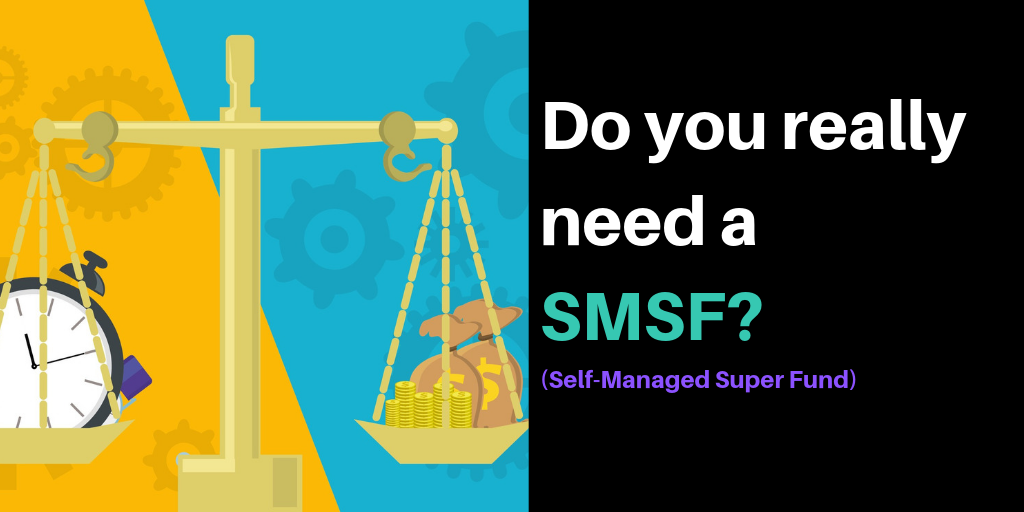Do you need a Self-Managed Superannuation Fund (SMSF) …or do you just WANT one?
SMSF’s are an absolute boom industry in Australia. There are around 600,000 of them operating and well over a million members involved in them.
So, are they a good idea?
Fran looks at the pro’s and con’s to help you make the right decision.
Reasons to have an SMSF
There are four reasons you may find a Self-Managed Superannuation Fund is for you:
1. Control is the big one.
That superannuation fund is OURS and no-one is going to care about it as much as we do. We could do better than the faceless minions toiling away in the cubicles of the business and banking world, right? We’re financially savvy and every investment decision we’ve ever made has been great, right? Well, maybe not but it’s our money and if we’re in control of it we’ll know exactly where it is and what it is doing. We get to choose the assets we buy, not just selecting “balanced” in the offered fund alternatives.
2. Reducing fees.
If you’ve got a few dollars in superannuation and the fund managers are pocketing 2% every year to manage it for you, it can look appealing to take over. This would mean replacing management and the ‘variable balance-based fees with ‘set fees’ for only doing the required tax reports and audits. There is a bit of a tipping point where this makes sense. If you’re paying fees above $4000 (2% of $200,000 being $4,000) you might see an advantage in having an SMSF where the annual fees could be well be under $3,000.
3. Keeping it in the family.
An SMSF is a good option for family units. They can become like a family business and build towards common goals shared by family members.
4. Loans.
You can now use your SMSF for asset loans. This has opened the door for investing in real estate even if your fund doesn’t have enough to pay for the asset in cash. However, it’s important to note there are strict guidelines to follow.
Reasons not to have an SMSF
There are six reasons a Self-Managed Superannuation Fund might not be right for you:
1. Have you got the time?
There is a significant amount of time required for managing the fund and doing administrative tasks. A third of people quizzed about this aspect said it took much more time than anticipated. The time required will depend on how active the management needs to be. You’ll need to watch the investments and discuss strategies with other members. You’ll also need to liaise with accountants, property managers and bankers.
2. Performance is key.
To justify the cost, time, and effort required your fund will need to out perform industry standards. The net earnings should be level or above industry offerings to justify the effort. Keep in mind you’ll be competing with trained and experienced investors. It is important for members to discuss whether the effort is worth the reward.
3. Keeping it in the family.
We all know family and business can be a difficult mix. Conflicting views on investment strategy, relationship breakdowns, and uneven commitment. For example, if one members feels they contribute more than another, they could feel disadvantaged. These can all have a flow-on effect interfering with the performance of the SMSF.
4. Insurances.
Commercial or industry funds can offer well priced group policies. Unfortunately, in an SMSF you won’t have access to these and would need to organise your own insurance.
5. They keep changing The Rules!
Superannuation is a pot of gold that the government is trying to tap into by changing taxation rules. The Government have set new limits on how big a fund can be to remain on lower tax rates. The recent threat of removing refunds for input tax credits would also have an affect on SMSFs. Although, making long term plans when the rule framework is uncertain may not be something you want to do. It means keeping up with changes that may impact your decisions down the track. It’s important to include this in your regular maintenance.
You can read more about the Input Tax Credits threat HERE.
6. Liability.
The trustees of the SMSF will be responsible for actions taken by your SMSF. It is important to follow the guidelines you’ve had written into the Trust Deed when the fund is set up. There are strict laws and taxation rules, and ignorance is no defence if they’re broken.
As you can see, there is a lot to think about if you’re considering a Self-Managed Superannuation Fund. Before steaming ahead, talk about these points with the people you’re going into an SMSF with. It’s important to have good communication and understanding about these topics before proceeding.
If you’re re-thinking the idea of an SMSF, there are some alternatives to explore. Consider the “do-it-yourself” style of fund offered by some Superannuation Providers. These allow you to make detailed choices about your investments.
Here’s some excellent general information from ASIC to read through:

